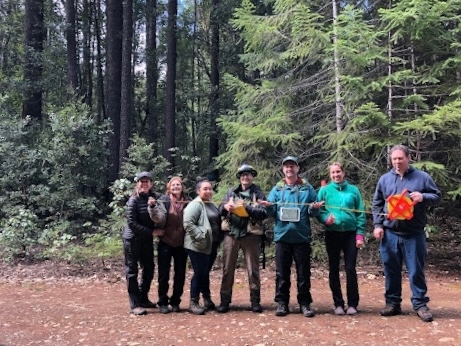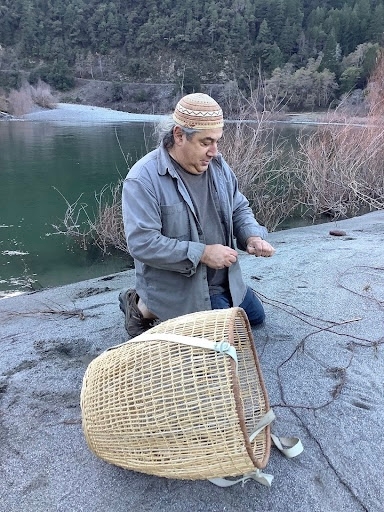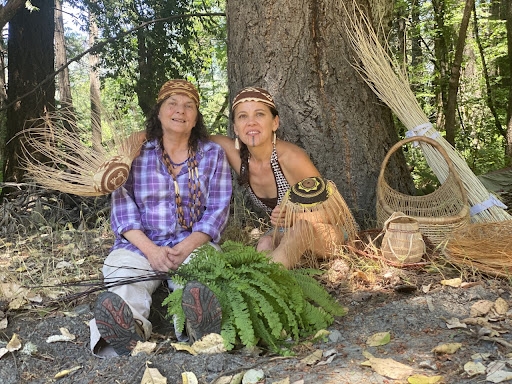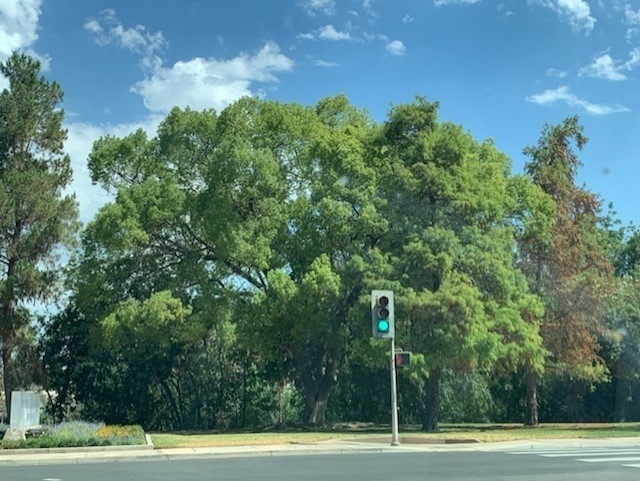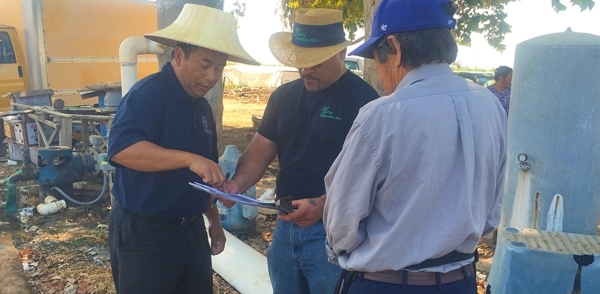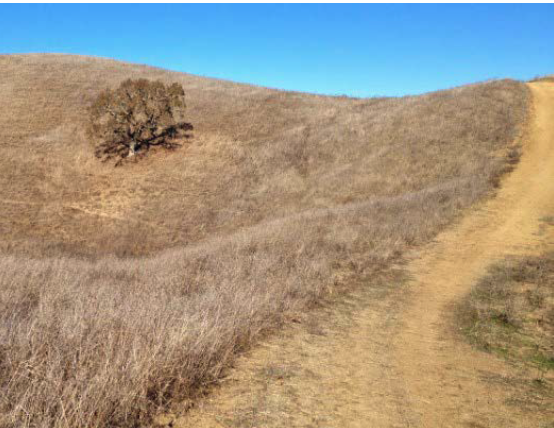Posts Tagged: Jennifer Sowerwine
Lawn-pocalypse! Surviving Drought
Ah, summer! The season of sunburns, pool parties, and… lawn droughts. If your once lush, green carpet now looks like a crunchy brown doormat, you're not alone. Let's dive into why your yard is staging a dramatic death scene and what you can do to...

Bermuda grass and weeds overtaking drought stressed turf grass.
Sowerwine named SFS Strategic Initiative leader
I am pleased to announce that Jennifer Sowerwine has accepted the position of leader for the Sustainable Food Systems Strategic Initiative. She has been a UC Cooperative Extension specialist in the Department of Environmental Science, Policy & Management at UC Berkeley since 2014. Her research and extension is focused on development of equitable, economically viable and culturally relevant food systems in metropolitan areas.
In Northern California, she has collaborated with Karuk, Yurok and Klamath tribal leaders and community members to restore their food security. In the Central Valley, she spent years working with Southeast Asian farmers. More recently, Jennifer has been studying how community farms and gardens improve food security among at-risk people in the urban East Bay.
Jennifer's experience in designing community-led food systems projects with under-represented Californians will be informative as we strive to solve new food-related challenges. We are fortunate to have her lead us in this role.
Jennifer succeeds Rachel Surls, who has led the Sustainable Food Systems Strategic Initiative for the past 18 months and is retiring this month from her 35-year career.
UC ANR's Strategic Initiative leaders work with their respective strategic initiative panels to improve communication, highlight research/extension gaps, and conduct detailed panel meetings. SI Leaders represent their panels, program teams and statewide programs/institutes at Program Council, providing programmatic input into resource allocation recommendations.
Jennifer joins SI leaders Helen Dahlke for Water Quality, Quantity and Security; Josh Davy for Sustainable Natural Ecosystems; Tom Turini for Endemic and Invasive Pests; and Steven Worker for Healthy Families & Communities.
Brent Hales
Associate Vice President
Indigenous science key to adapting to climate change
UC Berkeley and Karuk Tribe use Indigenous and western science to cultivate resilient food systems under changing climate conditions.
To adapt to climate change, Karuk Tribe members identified the importance of monitoring climate stress on plant species and actively managing and restoring healthy ecosystem processes to increase the consistency and quality of their food harvests, according to a new report. The Karuk Tribe's Aboriginal Territory encompasses over a million acres in the Klamath Basin in Northern California and Southern Oregon.
The Karuk Tribe-UC Berkeley Collaborative has released findings from its four-year collaborative research in their report “Karuk Agroecosystem Resilience and Cultural Foods and Fibers Revitalization Initiative: xúus nu'éethti – we are caring for it.”
To assess climate-change impacts on cultural-use plants and their habitats and to develop strategies and tools for long-term monitoring, this project integrated Indigenous and western science perspectives.
“Understanding the breadth and intensity of climate change with regard to our cultural resources is key to developing adequate response plans,” said Karuk cultural practitioner and project co-lead Lisa Morehead-Hillman. “Without healthy stands (of trees), our cultural practices suffer. We all suffer.”
The report authors lay out specific place-based management and monitoring actions that will enhance the resilience of cultural focal species and habitats to climate change, climate variability and management threats.
To support the resilience of Indigenous cultural agroecosystems and cultural food and fiber species, as well as strengthening Indigenous food sovereignty now and into the future, the authors recommend the following management, policy, research and institutional actions:
• Supporting Karuk Tribal natural resource, data and knowledge sovereignty through appropriate engagement and Tribal oversight.
• Investing in Tribal management infrastructure and workforce development to support culturally appropriate, place-based job opportunities for Tribal members and descendants.
• Supporting co-management and family-based stewardship of cultural use plants and habitats on Karuk Aboriginal lands.
• Investing in and supporting the re-acquisition of Karuk Aboriginal lands to build back the Tribal land base and restore habitats and ecosystems.
• Funding research, monitoring, and educational opportunities that can support youth leadership development, job creation, agroecosystem resilience, and food sovereignty in Karuk Aboriginal Territory.
This research builds on the findings from a five-year Karuk Tribe-UC Berkeley Collaborative food security project (2012-2018), which found that 92% of all Tribal households in the Klamath River Basin experienced some level of food insecurity, and that having access to cultural foods was a strong predictor of food security, yet only 7% of all Tribal households had access to good quality cultural foods at all times.
“This project applies what we learned from tribal members about food insecurity and climate and land management threats to cultural foods to the landscape level, co-creating methods and tools with our Karuk colleagues to assess and restore the health, quality and abundance of cultural foods and fibers to promote food security and eco-cultural resilience,” said Jennifer Sowerwine, lead UC Berkeley collaborator and associate professor of Cooperative Extension.
Research objectives centered around the “Agroecosystem Condition Assessment,” in which UC Berkeley and Karuk researchers and cultural practitioners assessed the health, quality and yield of 20 cultural-use focal plants prioritized by the Karuk Tribe, such as tanoak acorns, evergreen huckleberry, bear grass and hazel, as well as the condition of their habitats.
“This project demonstrates the benefits of working with a diverse research partnership in the co-production of climate science using blended Indigenous and Western research and monitoring methods,” said project collaborator Frank Lake, research ecologist and USDA Forest Service Pacific Southwest tribal liaison. “This project exemplifies recent federal directives and initiatives to support tribes for climate adaptation, forest restoration and eco-cultural revitalization.”
The overall quality and condition of most of the focal species found in the research plots and patches reflect both the devastating impact of colonial land-management practices – including timber harvest, fire exclusion and mining – as well as clear evidence of climate stress such as aborted fruit, early die back and poor-quality product. Forced exclusion of cultural management is reflected in encroachment of invasive species, inappropriate canopy cover and poor-quality harvests impacting both human and animal access to these important plant resources.
“This work done among Indigenous knowledge holders and academia is paramount to developing and sustaining a well-trained workforce for the future,” said Bill Tripp, director of the Karuk Tribe Department of Natural Resources and project co-lead. “We have a long way to go in realizing cultural relevancy in addressing the systemic injustices that plague our people, accelerate climate change, and work against ecosystem process and function.”
Based on research findings informed by the deep insights of Karuk natural resources managers, Karuk elders and cultural practitioners, the report outlines recommendations for restoring key habitats and revitalizing culturally significant species to enhance agroecological resilience in Karuk Aboriginal lands, which are concurrently administered, managed and occupied by U.S. Forest Service and private landowners.
Kathy McCovey, a Karuk cultural practitioner, archaeologist, forest ecologist and project collaborator, explained the cultural significance of the project:
“Through this project, we are learning how to reconnect with place,” McCovey said. “In learning about and tending these areas, we are tending our family gardens. It's all about people in place. Working on this project, we are working to bring these places back to life. We're rediscovering their Karuk names and how those names signal traditional uses of plants in those places. That way we can reconnect with the places our families come from”.
“The whole river system is full of knowledge,” she elaborated. “It's a crucial time for the Karuk people to tend these areas and learn how to take care of them. This community has knowledge that's developed and evolved with these lands and we have a responsibility to support the plants in these areas. We had our land stolen out from under us, but we still live here, we still know how to tend and gather plants, we still have our knowledge and our ceremonies. We still have the ability to go out and gather from the land. We still know how to take care of this place. We take care of the land and it takes care of us.”
This project serves as an example of how university and federal agency researchers can partner with California tribes to lift up Indigenous knowledge, which can help all involved to better understand and develop solutions to the climate crisis and its effects on California's landscapes and biodiversity, especially on species of cultural significance to Indigenous communities.
Funding for the project was provided by a grant from the USDA NIFA Agriculture and Food Research Initiative Resilient Agroecosystems under Changing Climate Challenge Area.
Download the free report at the Karuk-Berkeley Collaborative website: https://nature.berkeley.edu/karuk-collaborative/wp-content/uploads/2023/03/Karuk-Resilience-Report_Smallest-file-size.pdf
Climate-Change Resources
University of California UC ANR Green Blog (Climate Change and Other Topics) https://ucanr.edu/blogs/Green/index.cfm?tagname=climate%20change (full index)
Examples:
- Save Trees First: Tips to Keep Them Alive Under Drought https://ucanr.edu/b/~CdD
- Landscaping with Fire Exposure in Mind: https://ucanr.edu/b/~G4D
- Cities in California Inland Areas Must Make Street Tree Changes to adapt to Future Climate https://ucanr.edu/b/~oF7
Drought, Climate Change and California Water Management Ted Grantham, UC Cooperative Extension specialist (23 minutes) https://youtu.be/dlimj75Wn9Q
Climate Variability and Change: Trends and Impacts on CA Agriculture Tapan Pathak, UC Cooperative Extension specialist (24 minutes) https://youtu.be/bIHI0yqqQJc
California Institute for Water Resources (links to blogs, talks, podcasts, water experts, etc.) https://ciwr.ucanr.edu/California_Drought_Expertise/
UC ANR Wildfire Resources (publications, videos, etc.) https://ucanr.edu/News/For_the_media/Press_kits/Wildfire/ (main website)
-UC ANR Fire Resources and Information https://ucanr.edu/sites/fire/ (main website)
-Preparing Home Landscaping https://ucanr.edu/sites/fire/Prepare/Landscaping/
UC ANR Free Publications https://anrcatalog.ucanr.edu/ (main website)
- Benefits of Plants to Humans and Urban Ecosystems: https://anrcatalog.ucanr.edu/pdf/8726.pdf
-Keeping Plants Alive Under Drought and Water Restrictions (English version) https://anrcatalog.ucanr.edu/pdf/8553.pdf
(Spanish version) https://anrcatalog.ucanr.edu/pdf/8628.pdf
- Use of Graywater in Urban Landscapes https://anrcatalog.ucanr.edu/pdf/8536.pdf
- Sustainable Landscaping in California https://anrcatalog.ucanr.edu/pdf/8504.pdf
Other (Non-UC) Climate Change Resources
Urban Forests and Climate Change. Urban forests play an important role in climate change mitigation and adaptation. Active stewardship of a community's forestry assets can strengthen local resilience to climate change while creating more sustainable and desirable places to live. https://www.fs.usda.gov/ccrc/topics/urban-forests
Examining the Viability of Planting Trees to Mitigate Climate Change (plausible at the forest level) https://climate.nasa.gov/news/2927/examining-the-viability-of-planting-trees-to-help-mitigate-climate-change/
Reports and other information resources coordinated under the auspices of the United Nations and produced through the collaboration of thousands of international scientists to provide a clear and up to date view of the current state of scientific knowledge relevant to climate change. United Nations Climate Action
Scientific reports, programs, action movements and events related to climate change. National Center for Atmospheric Research (National Science Foundation)
Find useful reports, program information and other documents resulting from federally funded research and development into the behavior of the atmosphere and related physical, biological and social systems. Search and find climate data from prehistory through to an hour ago in the world's largest climate data archive. (Formerly the "Climatic Data Center") National Centers for Environmental Information (NOAA)
Think tank providing information, analysis, policy and solution development for addressing climate change and energy issues (formerly known as the: "Pew Center on Global Climate Change"). Center for Climate & Energy Solutions (C2ES)
Mapping Resilience: A Blueprint for Thriving in the Face of Climate Disaster. The Climate Adaptation Knowledge Exchange (CAKE) was launched in July 2010 and is managed by EcoAdapt, a non-profit with a singular mission: to create a robust future in the face of climate change by bringing together diverse players to reshape planning and management in response to rapid climate change. https://www.cakex.org/documents/mapping-resilience-blueprint-thriving-face-climate-disaster
Cal-Adapt provides a way to explore peer-reviewed data that portrays how climate change might affect California at the state and local level. We make this data available through downloads, visualizations, and the Cal-Adapt API for your research, outreach, and adaptation planning needs. Cal-Adapt is a collaboration between state agency funding programs, university and private sector researchers https://cal-adapt.org/
Find reports, maps, data and other resources produced through a confederation of the research arms of 13 Federal departments and agencies that carry out research and develop and maintain capabilities that support the Nation's response to global change. Global Change (U.S. Global Change Research Program)
The Pacific Institute is a global water think tank that combines science-based thought leadership with active outreach to influence local, national, and international efforts to develop sustainable water policies. https://pacinst.org/our-approach/
Making equity real in climate adaptation and community resilience policies and programs: a guidebook. https://greenlining.org/publications/2019/making-equity-real-in-climate-adaption-and-community-resilience-policies-and-programs-a-guidebook/
Quarterly CA Climate Updates and CA Drought Monitor Maps (updated each Thursday) https://www.drought.gov/documents/quarterly-climate-impacts-and-outlook-western-region-june-2022
Drought focus of Water Resources IMPACT magazine special issue
UC ANR experts address emotional toll of drought
Preparing the American West for prolonged drought is the focus of a double issue of Water Resources IMPACT magazine. The California Water Commission staff are guest editors for this special open-access edition of the magazine, which is published by the American Water Resources Association.
Faith Kearns, academic coordinator of University of California Agriculture and Natural Resources' California Institute for Water Resources, is among the authors delving into how drought impacts people and the environment and how we can better prepare for the inevitable.
The first issue, published on Feb. 14, focuses on water scarcity issues confronting California and the ways these issues affect different sectors.
In “Trauma, Care, and Solidarity: Addressing the Emotional Toll of Chronic Drought,” Kearns highlights the effects of drought on mental health. She points to the spike in suicide hotline calls when wells ran dry in Southeast Asian communities in California's Central Valley.
By listening to Southeast Asian farmers, Ruth Dahlquist-Willard and Michael Yang of UC Cooperative Extension were able to “lighten the load” for them by providing pragmatic support, Kearns writes.
“The scale of some of these highly emotional issues – drought, wildfires, climate change – can make them seem incredibly difficult, if not impossible, to deal with,” Kearns said. “At the same time, they are affecting everyone living in the western U.S. on a daily basis. I wanted to highlight and provide models based on work that people – whether they are researchers, clinical psychologists, or Cooperative Extension advisors – are doing right now to ease the way.”
The authors who contributed to the double issue are a diverse array of Tribal experts, academics, nongovernmental organization thought-leaders, water managers and water policy influencers, each of whom brings their own perspective on the topic of drought. Their expertise and perspectives in climate science, water policy and water management will help inform drought-related decision-making and support policies that better prepare the state to thrive during periods of prolonged water scarcity.
In addition to Kearns, the first issue includes articles contributed by:
- Samantha Stevenson, University of California, Santa Barbara
- Jay Lund, University of California, Davis
- Ron Goode, North Fork Mono Tribe
- Andy Fecko, Placer County Water Agency
- Jeff Mount, Public Policy Institute of California, and Ted Grantham, University of California, Berkeley/UC Cooperative Extension
- Nat Seavy and Karyn Stockdale, National Audubon Society
- Kjia Rivers, Community Water Center
- Cannon Michael, Bowles Farming
- Michelle Reimers, Turlock Irrigation District
The January/February edition of Water Resources IMPACT magazine can be accessed, free of charge, on the American Water Resources Association website at https://www.awra.org under “Publications.”
The second issue, to be published in March, will focus on drought response, considering the options for adaptation. This two-part series complements the Commission's work on strategies to protect communities and fish and wildlife in the event of a long-term drought.


